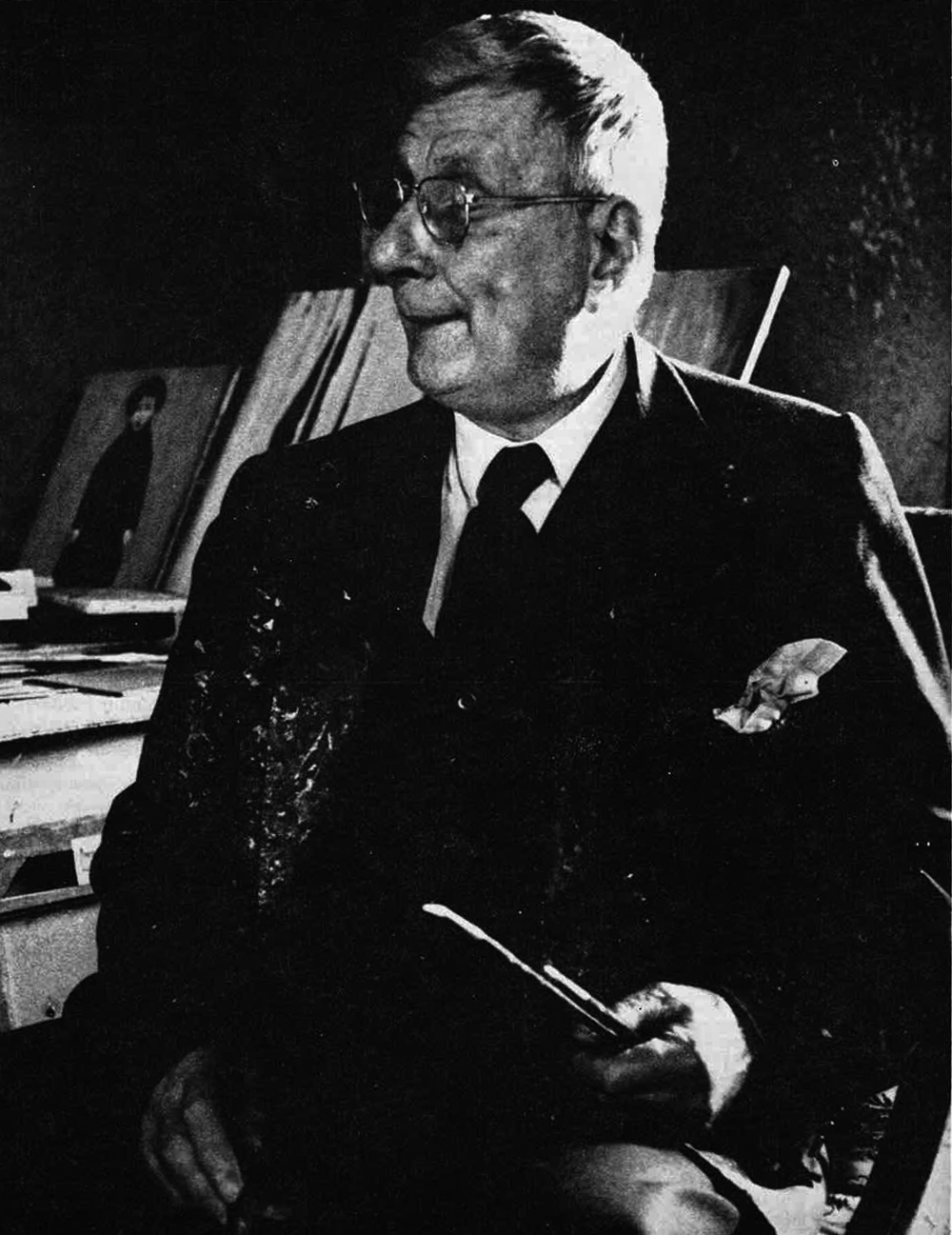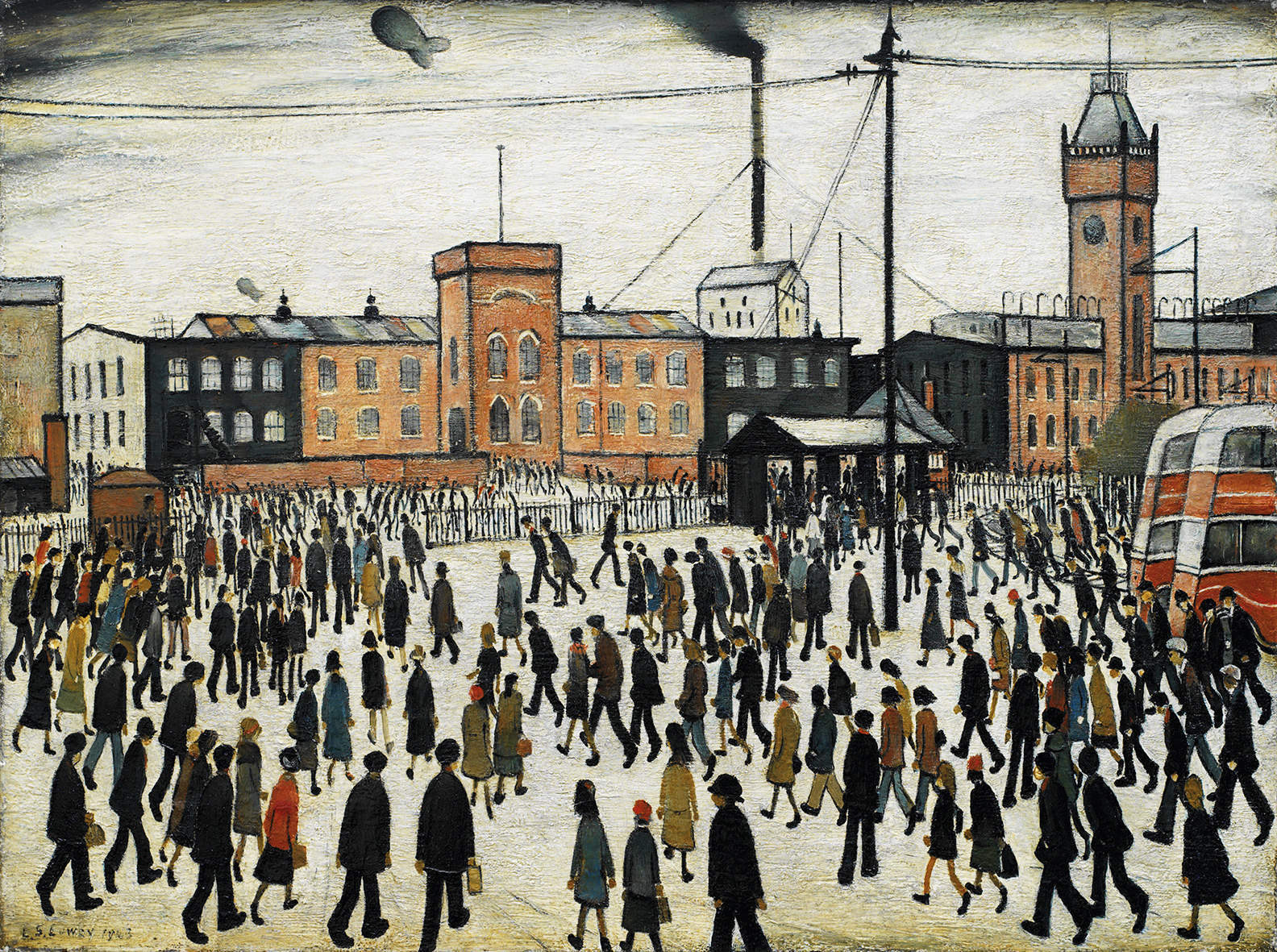From 1966: L.S. Lowry spills all about art school and being a lazy man, the critics who attacked his ‘figures like insects’ and why he feels so lonely
Barrie Sturt-Penrose You were born at a time when most British artists were painting Sunday School Virgins, and King Arthur’s Knights. Can you tell me something about your background because it must surely be the key to many of your paintings?
L.S. Lowry My grandfather and grandmother lived in Ireland. Father was an estate agent and went to his office in Manchester every day of the week. A very sober, punctual man, my father. He was a typical businessman of his time. My mother was an altogether different kind of person. She was a very able pianist, for example! And she had a wonderful eye for beautiful things. As you can see in my room I have a good collection of old china and clocks – most of it came from her. Unfortunately, she did not really understand my paintings, but she understood me in her curious way and I can’t ask for more than that.
BSP I find it very difficult to understand WHY you wanted to paint in the first place.
LSL I’m not fond of work, you know. Nobody painted in my family as far as I know. I drew little ships on the sea when I was a boy of eight, so an aunt of mine suggested I went to the local art school. I’d nothing against the idea and I was willing to try anything rather than take the usual humdrum job, sir! As I say, I’ve always been a rather lazy man at heart, thinking of the time when I can sit back and do nothing. I’m 79 years old now and I’m still not allowed to retire. I’m fed up with painting, I can tell you.
BSP What kind of surroundings did you grow up amongst?
LSL Well, after living in Rusholme, a suburb of Manchester, my family went to live, that would be 1909, at 117 Station Road, Pendlebury, which is midway between Manchester and Bolton. And for a long time I disliked it intensely. Then after years I got used to it and then I became interested and then finally obsessed. As you may know, from 1920 I painted nothing else but industrial scenes.
BSP I suppose you learnt the traditional lessons of antique drawing at art school, and all the other hangovers which made up the curricula of Victorian-Edwardian art schools?
LSL You’ve no idea how long I spent on freehand, antique anatomy and full-length studies. At art school they wanted accuracy more than anything else. Rather than start you doing a sketch out of your head, sort of slapdash, and then say, ‘Oh that’s very good!’, they’d make you work for weeks and weeks and weeks on one drawing of a tree. If you were in an art school, you drew like you would in an art school. And we didn’t all come out like Titian, sir! Today, it seems the art schools are at the other extreme. Anything goes now. Everything is worthy of praise. I don’t really know where it will all end. I don’t really approve of this slap-happy attitude I’ve come across, but I’m no expert, you know. Well, at my art school we had a Frenchman and he was interested, of course, in French painting. At that time nobody had heard of French Impressionism in this country, but this chap, he was a teacher you see, knew something about the things going on over there. Apart from what he told us I knew, and saw, the ordinary sort of paintings that most people do when they’re students. I kept on painting portraits and landscapes. I’ve still got this painting of my mother and, oh yes, this one of my father as well. I think I did their portraits in 1911.
BSP What was the turning point in your career – the point when you began painting the industrial landscape?
LSL I told you we moved from Rusholme and that I got to know the local scenery. I disliked Pendlebury, which was our new home. Then I got used to it and used to everything about it. I got mildly interested in it even; it was industrial, you see, and everybody thought that it must be ugly and horrible. Well, at the art school in Manchester I’d never seen anything but the ordinary sort of paintings. Anyway, I began taking a closer look at the industrial landscape around my home and thought to myself: ‘I can’t recollect anybody else painting mills and the people who lived round and about’. I think other artists thought it all a bit too grey and depressing. I don’t know anybody since who has done it, not really seriously. Nobody’s made such a damn fool of himself because there’s no money in it.
BSP What did you do when you left the art school? Did you really expect to make a living as an artist?
LSL I thought I’d get by. My parents were very good to me; I lived at home, you see. I lived with them in Pendlebury for nearly forty years. Occasionally, I would sell a painting just when I was literally fed-up and all hope was gone. I’ve never been married as you know, and so I shared my joys and sorrows with my parents. I didn’t have the responsibilities that some people had. Oh, you should have seen the excitement when I sold a picture. My parents were so happy even if they didn’t really understand my work.

BSP Yours is I suppose an artist’s success story, but it did come very late in your life? Your popularity as a painter didn’t really begin until after the last war.
LSL I showed a few pictures at the Arlington Gallery in 1936, but I never did have much success in London. My paintings seemed to get more response in the places where people knew the subjects I was painting. You know, one day a dealer was in Bourlet’s, the framers, and he saw my work. He seemed to like it and told Bourlet’s to send it round to their gallery. Anyhow, I had this exhibition at the Lefevre Gallery in 1939 and it was a big success.
BSP Let me read you extracts from articles the critics wrote at the time of that exhibition. The art magazine Apollo suggested that you were ‘a self-taught painter, a Sunday painter, a primitive’. The Times thought that you were original but believed your work to be narrow and repetitive and your figures like insects. The Spectator’s critic wrote: ‘I resent the Lowry automaton so fiercely and I am inclined to think that some part of (his) convention rises out of his ability to draw the human figure’. What did you think of all that criticism at the time?
LSL Nothing, I can’t really say I remember reading it in the first place. Let people have their opinions. If they don’t like my work, they don’t.
BSP The critics attacked your ‘figures like insects’. How did they come about in the first place? Was it a carefully-contrived convention which you wanted to insert in the paintings you were producing I during the inter-war years?
LSL You know I don’t really know why I started bringing them into my pictures. I don’t really know how I see my little people. I was asked once by a young lady in a school of art: ‘Why do you do your figures like you do, Mr. Lowry?’ And I answered: ‘Well, because I can’t do them in any other way’. If I sit back and draw something they always seem to come out the same. It’s really most odd. Do you like them? I’m never sure what people really think?
BSP After your first London success I suppose the demand for your work has increased all the time?
LSL It’s all rather sad. Once upon a time it was fun getting my pictures into a big exhibition. I used to get one into an annual exhibition in Paris quite regularly. People I once knew have passed on and it’s no longer fun getting pictures into shows. Success came too late. I was an old man when I became known. Nobody remembers that I like talking about other things than paintings. All of these things make me feel more lonely. You can’t really wonder that my pictures sometimes reflect my own loneliness. I don’t consciously paint people in lonely situations… there’s nothing very lonely about a beach on August Bank Holiday; yet my people seem to do that themselves in my pictures. Look at one of my seascapes – they don’t really exist, you know, they’re just an expression of my own loneliness.
BSP What other painters do you admire? I know that you have your own collection at home.
LSL I like the Pre-Raphaelites better than the pop painters, put it that way. I’ve got this picture by Rossetti called ‘The Return of Tibullus to Delia’ and it has the original William Morris frame. Some people say Rossetti couldn’t draw hands properly and that he put too much detail into his pictures. I like detail. I cram as many figures as I can in many of my pictures. Good value, you know, for the people who finally has the picture!
BSP I sometimes suspect that you enjoy being a recluse… perhaps all this talk of loneliness hides your real reasons for living alone?
LSL I do and I don’t enjoy the life of a recluse. I escape from time to time because I’ve got rather tired of all the fuss, the press. I’m getting no younger. I’m fed-up to tell the truth. I feel really that I’ve done the job I set out to do of putting the industrial scene on the map as best I can. Now I want to get out of it. I should have got out of it in 1948, but people wouldn’t let me – ‘You must paint more pictures.’ I was a damn fool to listen. I was going to give it all up in 1948. I’ve never searched for all this so-called success. There’s no money in painting – the tax-man takes it all. I don’t want to paint much more. I might do a bit now and then but not much. I get no fun out of it now. People come to see me and ask for a drawing as though it’s the only thing they want in the world. The following week I notice it’s in one of the salerooms. It makes me feel cynical. You can understand that, I think it’s about time I retired.
Originally published in The Arts Review, no. 22, November 1966
